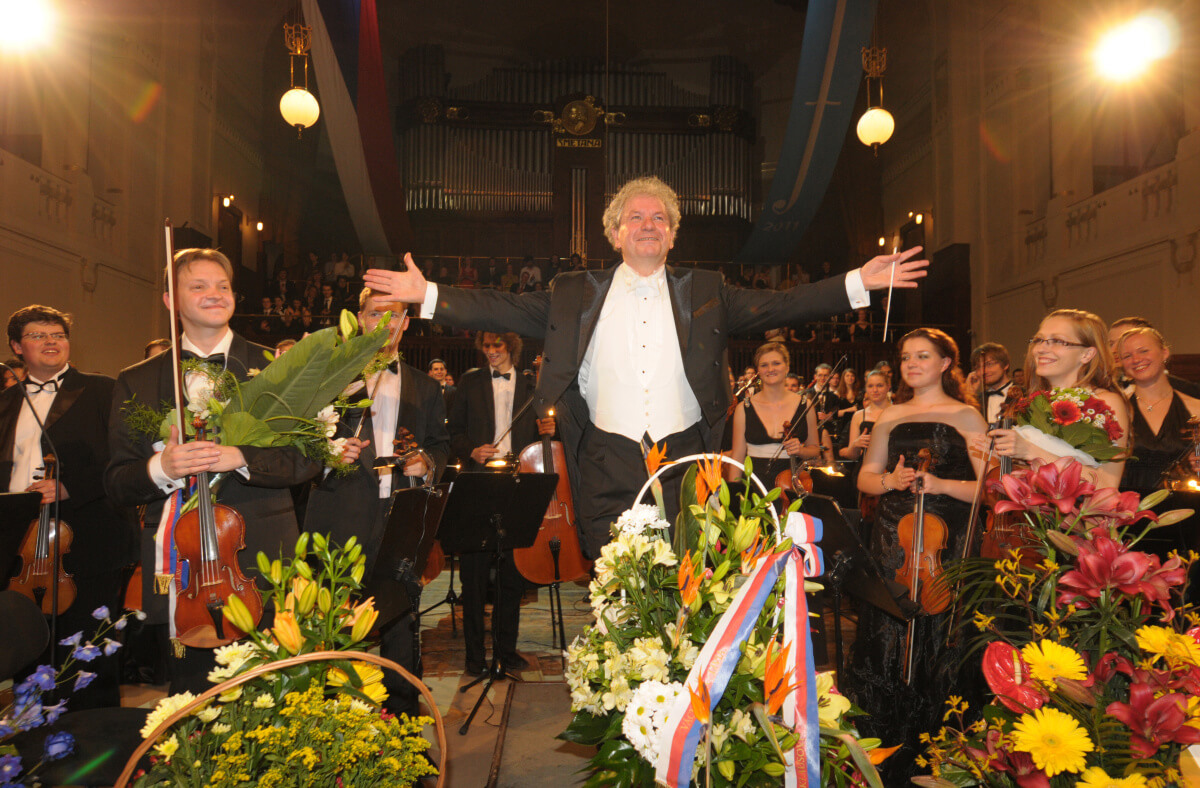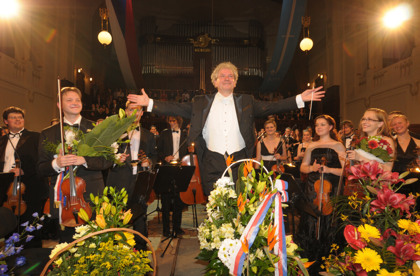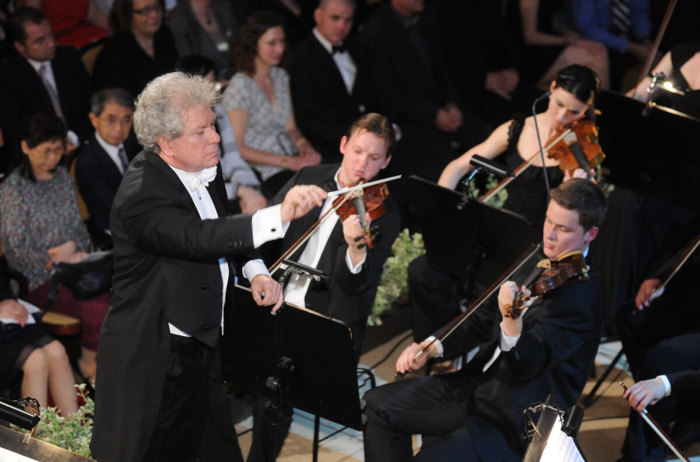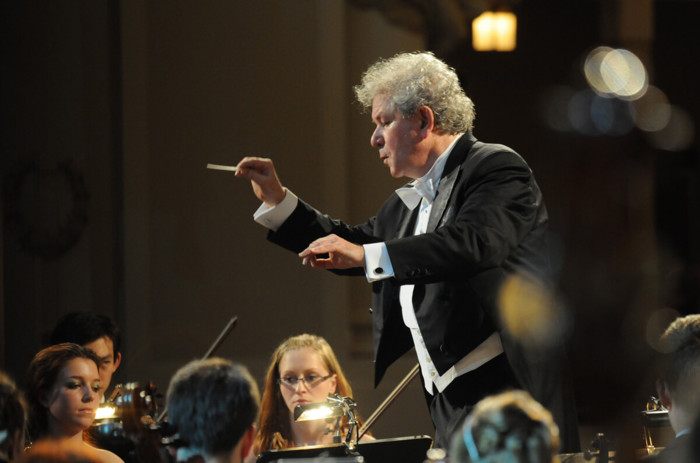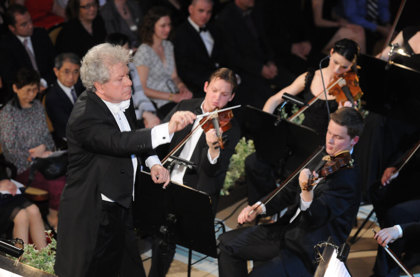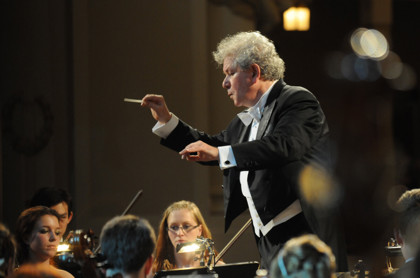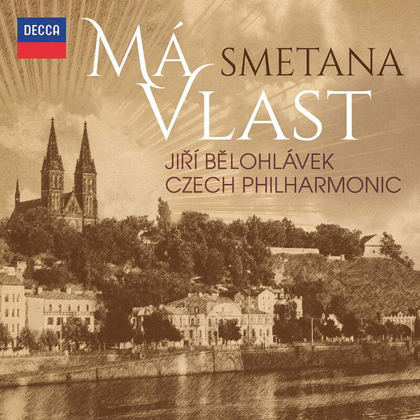This composition will always speak to certain genetic foundations in us, in our nation. This is unique in the repertoire anywhere in the world, I believe. You won’t find a work that would carry such a great national idea in such a wonderful rendering.
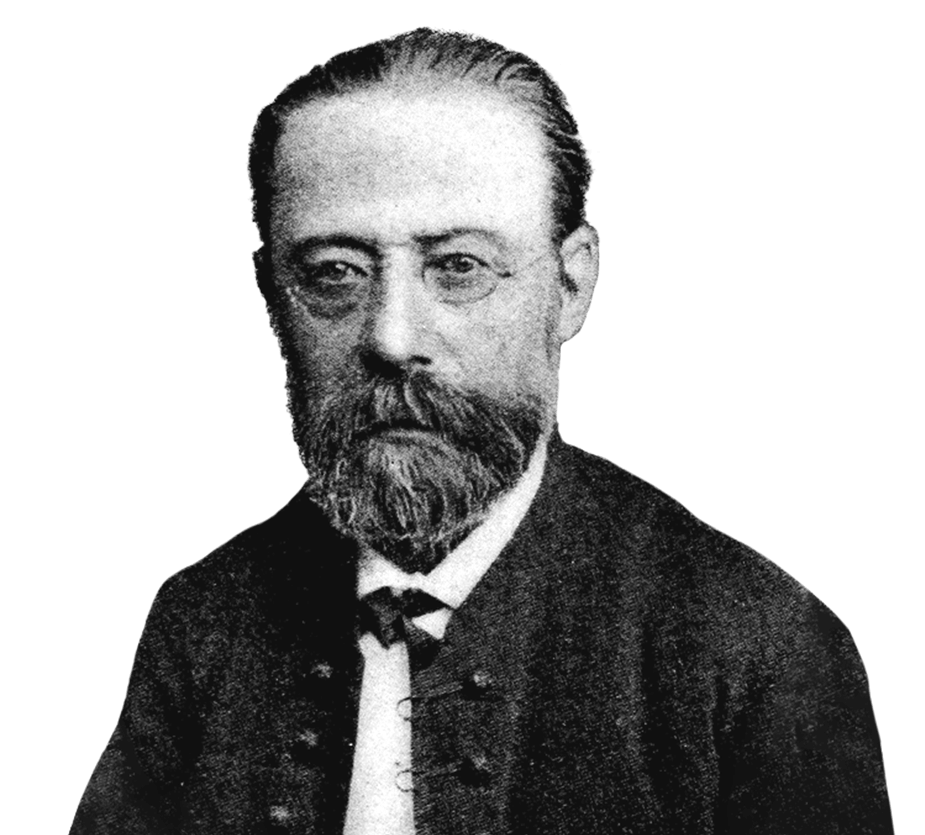
The total number of performances of compositions by
Bedřich Smetana: 776
The three most performed works
| 179 times | Vltava (Má vlast) |
| 122 times | Má vlast |
| 115 times | The Bartered Bride (overture) |
The statistical data compiled, published and shared by Alexander Goldscheider © Citing from his book Jiří Bělohlávek: A Life in Pictures. [ 2 ]
On hearing the name of Bedřich Smetana, the cycle of six symphonic poems Má vlast usually come to mind of Czech orchestras and even the whole nation. This representative work of Czech musical literature was grounded solidly in Bělohlávek’s repertoire and, for him, performing Smetana was an honorary and festive task that any conductor can be entrusted with. Má vlast was also the first printed score Bělohlávek was given by his father.
Bělohlávek studied individual works of the cycle already while at the conservatoire, where he performed Vltava with the conservatoire orchestra. Later at the Academy, he studied the cycle as a whole. His first performance of the full work was in 1969 with the Army Art Ensemble with which he had many more opportunities to perform the cycle and its parts during his military service.
Bělohlávek performed Má vlast with many Czech and Slovak orchestras. At the time when he was the chief conductor in Brno, he performed it at the Young Smetana’s Litomyšl Festival where his interpretation was enthusiastically received: „ In the chateau riding hall, the Brno Philharmonic performed Smetana’s “Má vlast” (My fatherland). (…) Gone was the official pretence of festival concerts where encores are out of the question. The young audience cheered and the symphonic poem “Šárka” was played as encore! (…) I have never witnessed a more spontaneous reception of the work than in Litomyšl then. It was obvious that Jiří Bělohlávek was a promising Czech master of the baton.” [ 3 ]
The cycle as a whole as well as individual symphonic poems (especially Vltava) were requested, often even required, programme elements on many tours, such as in a concert with the Prague Symphony Orchestra in Dresden in 1981.
J. Bělohlávek is a creator of order, discipline, tone culture, warmth, lustre and fullness of expression – as well as of a perfect eloquence of the score. If anyone expected the orchestra to reproduce the work solely in the romantic sphere of Czech melody, then they heard a different reality immediately. The young conductor emphasized music-making, musical flow and sound refinement and at the same time accentuated a clear, powerful and convincing approach that expressed the symphonic qualities of the work aptly. Such an interpretation gave the six-part cycle balanced, admirable contours and exquisite coherence. And so, the listeners were offered phenomenal music-making, full of bright power. The enthusiastic applause asked for an encore – the lovely Vltava.
When performing Má vlast repeatedly over the years, Bělohlávek tried various interpretative approaches. His mission always was to return to the score in a new and creative way. This was mentioned in an interview concerning his performance of the cycle with the Czech Philharmonic at the Prague Spring Festival in 1988: “I’ve tried to imagine being a person who approaches the work for the first time and knows nothing about it and is not yet influenced by anything. I tried to transform the expressive markings in the score (tempo, dynamics etc.) into different situations, onto a more general plain, and thus get a purer form, unburdened by tradition. Although – I must say – I distinguish between tradition and habit. I understand tradition as a living taking over of positive results whereas I understand habit as something very negative, as an expression of uncreative ossification.” [ 5 ]
What he considered the most challenging task while interpreting Má vlast, was to master the whole six-part cycle in a way that gave each part its own distinctive form and development, while remaining loyal to the whole. In other words, to provide the whole narration with logic and climax.
That’s one of the reasons Bělohlávek promoted performing Má vlast without the traditional intermission after the third part. He claimed that only when the work is played together does it carry the most power. He managed to carry this approach through while performing with orchestras abroad and he tried to push it through at the opening nights of the Prague Spring Festival. In 1988, he made a break after the fourth part while playing only Tábor and Blaník in the second half. In 2014 while opening the sixty-ninth Prague Spring Festival with the Czech Philharmonic it was finally possible to play the work “in one go”.
Bělohlávek opened the festival with Má vlast four times in total. The first time was in 1983 with the Czech Philharmonic, the second in 1988 with the same orchestra. In 2011, it was his third time, together with students of the Prague Conservatoire who, on the occasion of the 200th anniversary of their institution, created a student orchestra and rehearsed with their teachers and Bělohlávek and performed the whole symphonic cycle. The fourth and last time was in 2014, when he performed the opening concert with the Czech Philharmonic which he led as their chief conductor.
Bělohlávek performed Má vlast with a number of orchestras abroad, too. The first such orchestra to try out Má vlast under Bělohlávek’s baton was the Berlin Symphonic Orchestra in 1976. Other orchestras included the Japan Philharmonic Orchestra in 1979, 1997 and 2006, and the Boston Symphony Orchestra, Toronto Symphony, NHK Tokyo, London Symphony, Barcelona Symphony. In February 2006, Bělohlávek performed Má vlast with the Paris Opera Orchestra, which was the very first performance of the composition in Paris led by a Czech conductor. There are also several performances with the BBC Symphony Orchestra. Bělohlávek cherished the memories of performing the piece with the Berliner Philharmoniker in October 2007.
Belohlavek brought Smetana back to close out the evening, in a deeply satisfying account of ‚The Moldau‘ – the second (and probably most loved) of the six symphonic poems that make up ‚Ma Vlast‘. Belohlavek's conducting had been impressive all evening, with a superb command of the orchestral palette and an incisive sense of phrasing, but this was a ‚Moldau‘ to remember: soaring, transcendent and as lovingly evocative of the Czech landscape as anything ever written.
When studying the symphonic work with orchestras abroad, a double-edged character of the work often came to light. Everybody subconsciously understands the work to be “sweet music one can learn walking through a rose-garden, simply lovely music-making”. But then they realize with astonishment “how difficult the work actually is. It is always hard work. There is a kind of double-sidedness of performing the work abroad. Only having met all the demands of the work and overcome all the obstacles, does the orchestra offer the audience this gentle and beautiful impression. And in the end, the musicians love it.” [ 6 ]
Jiří Bělohlávek performed four of Smetana’s operas, the first one being The Secret at the Berlin Comic Opera in 1977, where he was invited as assistant conductor to Václav Neumann, who collaborated with the opera house frequently at the time. Bělohlávek’s second encounter with the world of Smetana’s operatic works was only twenty-four years later when he staged Smetana’s Devil’s Wall at the National Theatre in Prague in 2001. In 2008, he conducted The Bartered Bride, Smetana’s most well-known opera, at the historic Opéra national de Paris. He also gave a concert performance of the opera with the BBC Symphony Orchestra and Czech and Slovak singers in 2011. In the same way, he also performed Smetana’s Dalibor in 2015, which he considered Smetana’s best opera and had a great wish to stage it at the Metropolitan Opera.
Bělohlávek’s Smetana discography is dominated by Má vlast. His first recording of this work, with the Czech Philharmonic, was released in March 1990. It was recorded digitally in the Vladislav Hall of Prague Castle. The recording made for the Supraphon label and released on LP and CD got to be reissued many times.
There is also a DVD of Má vlast from the Prague Spring concert of 2011, performed by the student orchestra of the Prague Conservatoire. The DVD presents a recording of the concert as well as a documentary showing the background of the whole event and rehearsals of the student orchestra including a training session in Polička. Bělohlávek’s last recording of Má vlast is also a live recording from the Prague Spring Festival 2014, which was released by Decca on DVD, CD and digital formats.
As far as opera recordings are concerned, there is one of The Bartered Bride and one of Dalibor, made live at concert performances with the BBC Symphony Orchestra. The recording of the concert of The Bartered Bride was released in 2012 on the Harmonia Mundi label. A superb recording of Dalibor was released in 2015 on CD on the Onyx label.
The excellent all-Czech cast is admirably supported by the BBC Symphony Orchestra and BBC Singers under Jiří Bělohlávek. Of the handful of recordings in Czech this new album is hard to beat and let’s hope it sparks a revival of this overlooked masterpiece.
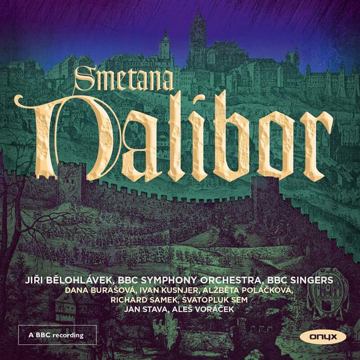
Main sources
- 1.
VEJVODOVÁ, Markéta: Rozhovor s Jiřím Bělohlávkem k zahajovacímu koncertu 69. mezinárodního hudebního festivalu Pražské jaro 2014. Český rozhlas Vltava 2014 (12. 5.). Available online
- 2.
GOLDSCHEIDER, Alexander: Jiří Bělohlávek: A Life in Pictures. 2017. Kniha na více než 600 fotografiích a 160 stránkách dokumentuje celoživotní dráhu Jiřího Bělohlávka s použitím tisíců unikátních statistických údajů. Available online
- 3.
VÍTEK, Bohuslav: Jiří Bělohlávek šedesátníkem. Harmonie 14, 2006, č. 2, s. 13.
- 4.
Sächsische Neueste Nachrichten 1981 (18. 9.)
- 5.
DOBROVSKÁ, Wanda: Má vlast – inspirující. Tvorba 1988, č. 22 (1. 6.), s. 14.
- 6.
VEJVODOVÁ, Markéta: Rozhovor s Jiřím Bělohlávkem k zahajovacímu koncertu 69. mezinárodního hudebního festivalu Pražské jaro 2014. Český rozhlas Vltava 2014 (12. 5.). Available online
- 7.
MOFFATT, Steve: Smetana: Dalibor (BBC Symphony Orchestra/Jiri Belohlavek). LimeLight 2016, 19. 8. Available online
VEJVODOVÁ, Markéta: Rozhovor s Jiřím Bělohlávkem k zahajovacímu koncertu 69. mezinárodního hudebního festivalu Pražské jaro 2014. Český rozhlas Vltava 2014 (12. 5.). Available online
GOLDSCHEIDER, Alexander: Jiří Bělohlávek: A Life in Pictures. 2017. Kniha na více než 600 fotografiích a 160 stránkách dokumentuje celoživotní dráhu Jiřího Bělohlávka s použitím tisíců unikátních statistických údajů. Available online
VÍTEK, Bohuslav: Jiří Bělohlávek šedesátníkem. Harmonie 14, 2006, č. 2, s. 13.
Sächsische Neueste Nachrichten 1981 (18. 9.)
DOBROVSKÁ, Wanda: Má vlast – inspirující. Tvorba 1988, č. 22 (1. 6.), s. 14.
VEJVODOVÁ, Markéta: Rozhovor s Jiřím Bělohlávkem k zahajovacímu koncertu 69. mezinárodního hudebního festivalu Pražské jaro 2014. Český rozhlas Vltava 2014 (12. 5.). Available online
MOFFATT, Steve: Smetana: Dalibor (BBC Symphony Orchestra/Jiri Belohlavek). LimeLight 2016, 19. 8. Available online
